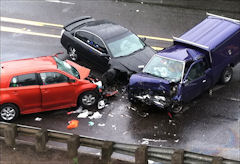 Uh, oh, the anti-tax wing of the Republican Party was already getting cold feet about Governor Bob McDonnell’s transportation funding plan yesterday. As Capital News Service quoted, Del. Ben Cline, R-Amherst, as saying in a press conference held by the General Assembly’s Conservative Caucus: “Conservatives want to see taxes kept low. They want to see a plan in place that locks in transportation funding for transportation purposes and not diverted to other uses. And they want to make sure working families aren’t subjected to excessive fee hikes.”
Uh, oh, the anti-tax wing of the Republican Party was already getting cold feet about Governor Bob McDonnell’s transportation funding plan yesterday. As Capital News Service quoted, Del. Ben Cline, R-Amherst, as saying in a press conference held by the General Assembly’s Conservative Caucus: “Conservatives want to see taxes kept low. They want to see a plan in place that locks in transportation funding for transportation purposes and not diverted to other uses. And they want to make sure working families aren’t subjected to excessive fee hikes.”
Then came the Wall Street Journal this morning with its lead editorial, punching hard against the McDonnell plan, which would eliminate the gas tax and jack up the sales tax, among other changes, to raise $1.8 billion for transportation construction projects over the next five years.
Applying Economics 101 logic, the Journal wrote:
The [plan] violates the user pays principle of sound tax policy. Drivers and truckers pay a fuel tax to cover the wear and tear they impose on the roads. By contrast, switching to a higher sales tax to finance roads would mean that a Virginia resident who may not even own a car has to pay more for road repairs when he buys a cell phone, computer or Big Mac. Motorists who benefit most from the roads would pay almost nothing directly to use them.
The Tax Foundation explains that funding transportation through a sales tax “makes roads free,” at least in terms of direct payments, and thus will lead to more driving and more gridlock—the opposite of what Mr. McDonnell says he wants to achieve. …
States that need more money for transportation should look toward efficient and innovative tolling technologies, which charge motorists for the time they spend on the roads and can lessen congestion through peak-hour pricing.
Quoting Virginia transportation analyst Ron Utt, the Journal also said higher taxes would misallocate state funds to underused public transportation projects, including $300 million for the Rail-to-Dulles project, a project it blasts for costing up to $40,000 per new round-trip weekday rider.
Undeterred, the McDonnell administration has racked up an impressive list of endorsements from business groups, including road and infrastructure industry associations, chambers of commerce, labor unions and railroad corporations. Find the details in press releases here and here.
One would hardly expect otherwise from construction unions and trade groups — they would be direct beneficiaries of the higher taxes. But the endorsements coming from chambers of commerce is a disappointment and a reminder that it’s one thing to be “pro business” and quite another to be “pro free markets.” Chambers of commerce understandably and legitimately value transportation mobility. However, as long as someone else is paying for roads and transit — in this case, the general public, as opposed to those who use the facilities — Virginia’s chambers are perfectly happy to raise taxes. Just don’t try raising taxes on them!
— JAB


